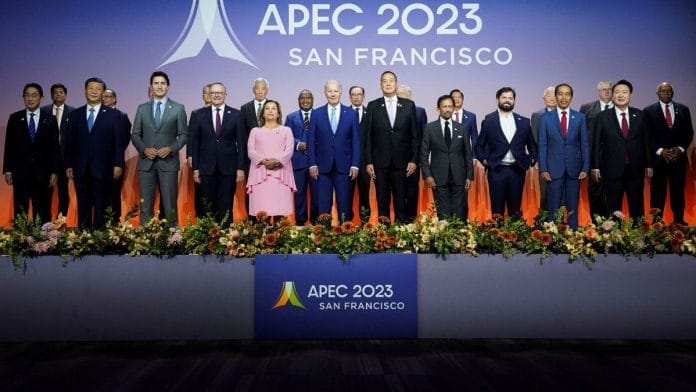San Francisco: In a significant development at the Indo-Pacific Economic Framework (IPEF), US President Joe Biden announced advancements in the crucial initiative proposed by the United States and supported by 13 APEC partners.
The Indo-Pacific Economic Framework involves Australia, Fiji, India, Indonesia, Japan, South Korea, Malaysia, New Zealand, Philippines, Singapore, Thailand, Vietnam, and the United States.
India’s representative Commerce and Industry Minister Piyush Goyal was also present on the stage as Biden delivered his address.
“Today we’re announcing progress on the important initiative that we proposed with 13 of my colleagues here and of 13 APEC partners, the Indo-Pacific Economic Framework. Australia, Fiji, India, Indonesia, Japan, South Korea, Malaysia, New Zealand, Philippines, Singapore, Thailand, Vietnam and the United States,” said Biden at the Indo-Pacific Economic Framework Family Photo.
The negotiations on this framework were launched in Tokyo in May 2022, with substantial progress made, although further work remains to be done.
“In May of 2022, we came together in Tokyo to launch negotiations on this framework. We still have more work to do, but we’ve made substantial progress,” President Biden added.
He also highlighted a three-hour meeting with all 21 APEC economies, emphasising discussions on generating growth and opportunities in the region, particularly addressing climate change.
“A three-hour meeting with all 21 APEC economies, discussing how to generate more growth and more opportunity in the region, particularly to deal with climate change,” Biden said.
Earlier in the day also, Biden reaffirmed the United States’ “commitment to strengthen” the semiconductor supply chain, with a special emphasis on collaborative efforts with key nations, including India.
President Biden also underscored the importance of working together with India, Japan, the Republic of Korea, and Singapore to strengthen the critical semiconductor industry.
India, specifically mentioned by President Biden, is set to play a pivotal role in this global initiative. The strengthened partnership between the United States and India in the semiconductor domain not only signifies the mutual commitment to technological advancement but also underscores the strategic importance of India as a key player in the global technology landscape.
The United States is committed to an Indo-Pacific that is free and open, connected, prosperous, secure, and resilient. To help realize that future, the Partnership for Global Infrastructure and Investment (PGI) and Indo-Pacific Economic Framework for Prosperity (IPEF), will work with IPEF partners and the private sector to scale high-standard investments, create more resilient economies, and drive long-term sustainable development, a White House Factsheet stated.
US Secretary of Commerce Gina Raimondo and Senior Advisor to the President Amos Hochstein hosted the PGI IPEF Investment Forum to discuss collaborative actions and shared priorities to increase private investment in the Indo-Pacific.
The US International Development Finance Corporation (DFC) and Government of India are continuing to partner toward a combined up to USD 1 billion investment in the India Green Transition Fund. This private credit Fund will target market-based returns, provide climate impact benefits, and accelerate the development of clean-energy transition projects in India through investments in solar, energy storage, and e-mobility.
Citi helped facilitate nearly USD 12 billion worth of transactions around the world, advancing sustainability and the clean energy transition, including the Monetary Authority of Singapore’s green bond, LG Energy Solution’s global green bond, Malaysian energy company Petronas’ India-based green ammonia venture, LG Energy Solution’s new electric vehicle (EV) battery manufacturing facility in Arizona, and General Motors & Samsung SDI’s new EV battery cell plant in Indiana.
Citi also provided a USD 100 million trade loan to ICICI Bank, supporting on-lending to low-income women micro-entrepreneurs primarily in rural India.
Notably, leaders of the 21-member Asia-Pacific Economic Cooperation Forum are meeting in San Francisco for the 30th APEC Leadership Summit being hosted by the US and chaired by President Biden.
APEC members account for 62 per cent of the global GDP and almost half of global trade. Its members are Australia, Brunei, Canada, Indonesia, Japan, S Korea, Malaysia, New Zealand, Philippines, Singapore, Thailand, US, Taiwan, Hong Kong, China, Mexico, Papua New Guinea, Chile, Peru, Russia and Vietnam. India, a major economy, is not part of APEC.
President Biden had invited Prime Minister Narendra Modi to attend this year’s APEC Leadership Summit. India is being represented by its Commerce and Industry Minister, Piyush Goyal. (ANI)
This report is auto-generated from ANI news service. ThePrint holds no responsibility for its content.






